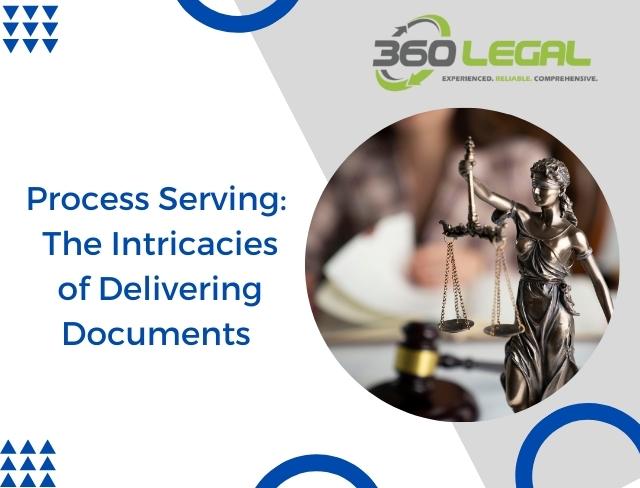Comprehending the Relevance of Refine Offering in Lawful Procedures
Process serving is an essential element of legal procedures that ensures all events are informed of their civil liberties and commitments. By facilitating the formal distribution of vital legal files, it maintains the concepts of due process and contributes to the honesty of the judicial system. The nuances of efficient procedure serving extend beyond mere distribution; they incorporate legal needs and possible consequences of inappropriate solution. Understanding these ins and outs can considerably impact the end results of lawful conflicts, prompting a better exam of the practices that underpin this important feature.
Meaning of Refine Serving
Refine serving is a critical part of the legal system, specified as the official distribution of legal documents to individuals associated with a court situation. This process makes certain that all events are adequately informed of legal actions being taken versus them or to which they are a celebration. Commonly, these records consist of summons, problems, subpoenas, and various other court-related documents that need the recipient's focus and reaction.
The importance of process offering depend on its duty in maintaining the principles of due process. It ensures that people have notification of legal procedures, thereby offering them a possibility to respond or protect themselves. Correct service of process is not simply a procedural formality; it is a basic aspect of guaranteeing fairness and openness in the judicial system.
Process serving can be carried out by various people, including professional process-server, legislation enforcement policemans, or also attorneys, depending upon administrative guidelines. Each method of service has its very own criteria and techniques, which are crucial to protecting against hold-ups or terminations within the legal framework. Therefore, understanding the definition and function of procedure serving is crucial for all stakeholders associated with lawful process.

Lawful Needs for Refine Offering
Lawful demands for procedure offering are vital to make sure that the shipment of lawful records complies with established protocols and is identified by the court. Each jurisdiction has specific regulations regulating just how and when files must be served, which might include subpoenas, issues, and summonses.
Generally, process servers need to be impartial third celebrations that are not entailed in the case. They should also adhere to state guidelines relating to solution methods, which can consist of individual service, alternative solution, or solution by mail. Individual service entails delivering papers straight to the recipient, while alternative solution enables for shipment to one more responsible person at the recipient's home or workplace.
Additionally, process-server are normally called for to submit an evidence of solution, a legal document that confirms the shipment of papers, with the court. This document consists of information such as the day, time, and method of solution, as well as the name of the person offered.

Function in the Justice System
A necessary element of the justice he has a good point system, process offering guarantees that people associated with legal procedures are appropriately alerted of activities taken against them (Process Serving). This official notification is essential for maintaining the principles of due procedure, which mandates that events have the chance to reply to insurance claims made against them. Without effective procedure serving, the lawful system would be provided inefficient, as people might participate in actions without awareness of pending legal issues
Process-server serve a vital duty in securing the stability of the legal procedure. They act as neutral parties, supplying lawful documents such as summons, grievances, and subpoenas, therefore fostering openness and accountability within the judicial framework. By making sure that all parties are notified, procedure serving aids to stop any kind of prospective unreasonable benefit, permitting fair engagement in legal procedures.
Moreover, the expertise of process web servers contributes to the public's trust in the justice system. Their adherence to lawful requirements and moral techniques strengthens the authenticity of the judicial process. Inevitably, reliable procedure serving is essential in promoting the rule of legislation and ensuring that justice comes to all individuals entailed in lawful disagreements.
Consequences of Improper Service
The effects of improper service can considerably threaten the honesty of legal proceedings. When a party is not served properly, it can bring about a host of issues, click to investigate including hold-ups in case timeline and raised legal expenses. Inappropriate solution can lead to the offender not knowing the lawsuit versus them, which might stop them from reacting suitably or offering their defense. This absence of notification can inevitably lead to fail judgments, where the court regulations in favor of the complainant without listening to the offender's side.
Furthermore, improper solution can render court orders and judgments invalid, forcing the complainant to reactivate the process, which can be both lengthy and monetarily difficult. It can also open the door to charms and challenges, as the defendant may say that they were not effectively informed of the process, making complex the legal landscape better.
Ideal Practices for Effective Service

Second, timing plays an important function. Serving files immediately can stop hold-ups in legal proceedings and ensure that all parties are informed in a prompt way. In addition, working with a specialist process-server can enhance performance, as they are trained to browse potential obstacles and guarantee compliance with local regulations.
Third, keeping precise records of the service process is critical. Documenting the date, time, and fashion of service can supply critical proof if disputes arise relating to whether service More Bonuses was correctly implemented.
Final Thought
Finally, process serving is a necessary part of lawful treatments, ensuring that all parties are duly informed and managed the possibility to react. Complying with lawful requirements and ideal techniques not only maintains the principles of due procedure yet likewise reinforces the integrity of the justice system. The effects of inappropriate service can lead to significant hold-ups and difficulties, highlighting the requirement for effective process serving in advertising justness and accessibility in lawful disagreements.
The subtleties of efficient process serving extend past simple delivery; they incorporate lawful requirements and prospective effects of inappropriate solution.Process serving is a vital component of the lawful system, specified as the formal shipment of lawful papers to people entailed in a court case. Without effective process serving, the lawful system would be rendered inefficient, as individuals could involve in activities without awareness of pending legal matters.
Process web servers offer a vital function in guarding the integrity of the legal procedure - Process Serving. The repercussions of inappropriate service can lead to significant delays and problems, highlighting the need for efficient procedure serving in advertising fairness and ease of access in legal disputes